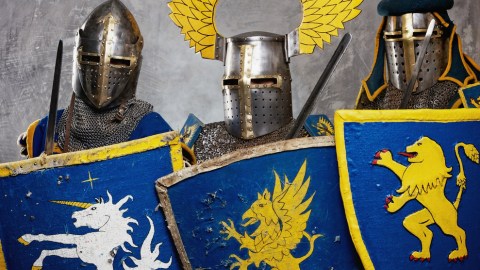Vocabulary Wars – How Nations Compete For Their Terminologies

“The true victory (the true ‘negation of the negation’) occurs when the enemy talks your language.” -Slavoj Zizek
CAPITALISM forces nations to compete for market shares, natural resources, and human capital. Less obvious so, they also compete for names, brands, and terminologies. It is time that Asian cultures bring their own terms to the table and defend their originality.
Already 2,500 years ago, humankind had spread the globe and clustered into countless groups, divisions and commandos now often referred to as ‘cultures.’ Cultures skimmed earth and sea, coined all things, played sophisticated mind games, and immortalized all their strange ideas and concept by giving them unique names. They sometimes adopted loanwords from each other, if one obviously had what the other had not, but such acts of generosity happened arbitrary and without system.
Most of the time, interesting ideas or concepts were simply plagiarized, stolen, or given new names to disguise their origin, to create familiarity, or to give them a new twist. In other words, all cultures – some more, some less – always used language as a sure-fire way to differentiate and distinguish themselves from the others or to expand at the cost of others. It also gave them an early sense of creativity, self-image, and cultural property rights: this is how we see it; this is how we name it.
Thus, for the most part of history if conquerors invaded a weaker culture, the latter’s “knowledge” was quickly disowned and simply “translated” into the conquerors’ own lexicon – as if the victorious had always owned it, as if they deserved it.
God’s administrators
Because translation was such an effective tool for expansion, ‘dictionaries’ were composed which technically reduced and limited the infinite world – all things known and unknown – to a tiny set of counted words. In effect, each and every tinsel nation, if it had its own dictionary, now believed it could – in practice – administer all knowledge and replace – in theory – all others cultures any time without any loss of information.
These man-made dictionaries grew over time but still clashed with empirical realities; for example we today know that there exist 3 to 30 million animal species in the world; yet the German dictionary in its entire never had more than ½ million words. Billions of human beings have had great ideas in ten thousand languages throughout the millennium, yet modern English, supposedly the “international language,” in 2013 barely counted 1.1 million words.
In history, no war could ever affect the faith of a nation more lasting than translation did: Saint Jerome ended the Jewish world order, literally, by translating the Hebrew Bible into Latin. And when Martin Luther, the German priest, translated the Latin Bible into German, the last reminiscences of the Roman Empire vaporized.
Institutionalized translation
As a rule, any nation that aims high in world history first translates all major works of its competitors into its own vernacular. This naturally creates a creepy “I Know You” effect, and indeed cruel theories have been proposed (by Georg Hegel, Max Weber etc.) about how only non-members can ever fully grasp a foreign culture or religion [which to this day only seems to work for Western scholars, apparently].
Another side-effect of institutionalizedtranslation was Europe’s dominance over Eastern thought, as European categories were now applied to Asia – one shoe to fit them all! Hence the common notion that India can’t think (for itself) and that China is a place of zero originality.
My language, your prison
Even today, long after the age of European colonialism supposedly ended, Western students and Eastern pupils are still conveniently taught that there are “saints” and “philosophers” all over Asia. Yet evidently there has never been a single “buddha,” “bodhisattva,” or “shengren” in Europe or America. Think. If this isn’t the continuation of European culture aiming for planetary dominance, what is?
Translators – a form of soldiers
The reduction of all the world’s vocabularies to a few inherently European words makes it effortless for our elites to compose for example a ‘Philosophy of China’ without using a single original Chinese term. Even the word ‘philosophy’ is a Western import.
Most intellectuals faint what total translation does: It destroys the target terminology and replaces it with another – it’s the killing of words, and it’s, talking about sophistication, not very far from its older brother genocide – the killing of people. Translators are just that – a form of soldiers.
Defenders of words
The world needs a common language in order to communicate. English may have become the international language, but it is far from a global language; in fact the future global language will have to adopt tens of thousands of non-Western concepts.
The coming emancipation of Eastern vocabularies is real and inevitable; and it will be met by heavy Western resistance (especially from the media and publishing industry). However, it is in the best interest of China or any other Eastern culture to identify, promote, and defend its own words, brands, and terminologies.
Image credit: Nejron Photo/Shutterstock.com




